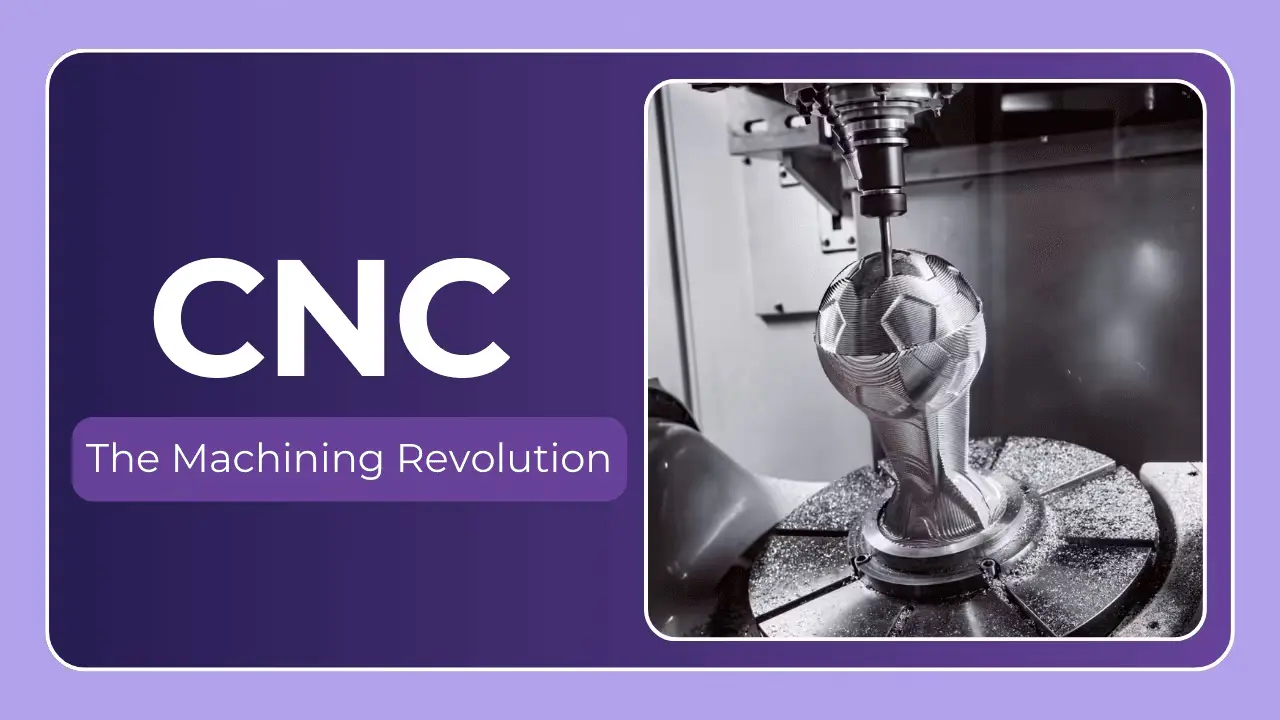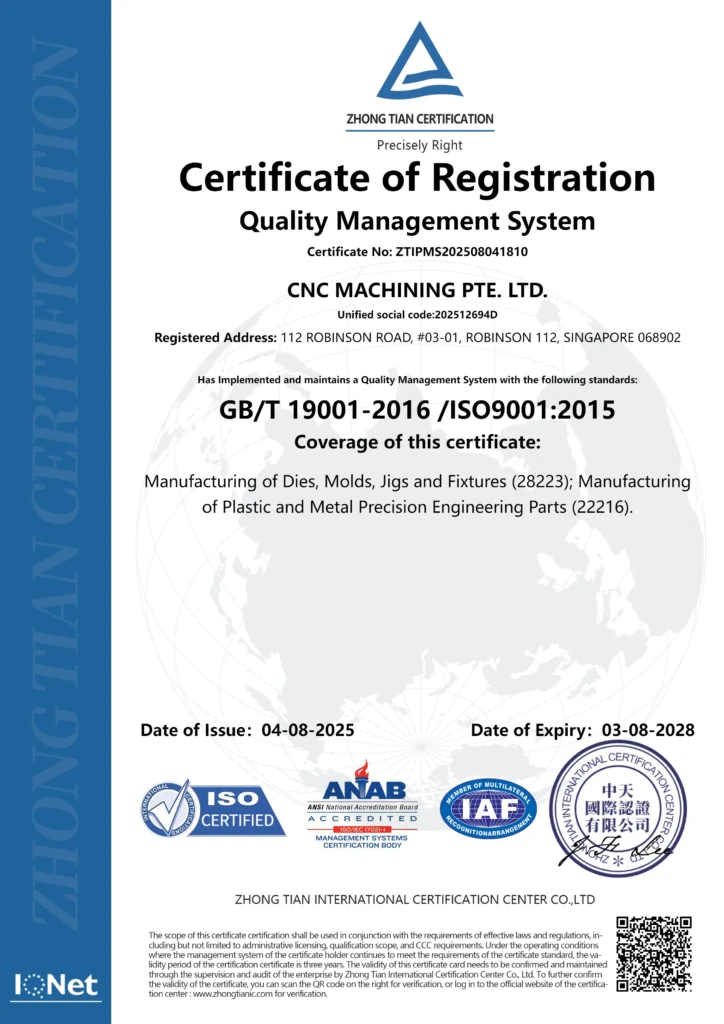Navigating the World of CNC Machining Materials: A Comprehensive Guide
CNC machining has revolutionized manufacturing, offering unparalleled precision, repeatability, and versatility. But achieving optimal results isn’t just about the machine itself; it’s deeply intertwined with the material you choose. Selecting the right material for your project is crucial, impacting everything from cost and machinability to the final product’s strength, durability, and functionality.
At CNC MACHINING PTE. LTD, a leading five-axis CNC machining manufacturer in Singapore, we frequently guide clients through this selection process. We’ve seen firsthand how a well-informed material choice can dramatically improve project outcomes. This guide aims to demystify the world of CNC machining materials, providing a detailed overview to help you make the best decision for your specific needs. We’ll cover common materials, their properties, applications, and considerations for successful machining.
Understanding Material Properties & Their Impact on Machinability
Before diving into specific materials, let’s establish key properties that influence how well a material can be CNC machined:
- Machinability: This refers to how easily a material can be cut, drilled, and shaped. Higher machinability translates to faster cutting speeds, longer tool life, and lower costs.
- Hardness: Harder materials generally require more robust tooling and slower feed rates.
- Tensile Strength: The material’s resistance to being pulled apart. Important for parts under stress.
- Yield Strength: The amount of stress a material can withstand before permanent deformation.
- Ductility: The ability of a material to deform under tensile stress. More ductile materials are generally easier to machine.
- Thermal Conductivity: How well a material dissipates heat. Good thermal conductivity is beneficial as machining generates heat.
- Corrosion Resistance: Important for parts exposed to harsh environments.
A Deep Dive into Common CNC Machining Materials
Let’s explore the most frequently machined materials, categorized for clarity.
I. Metals
Metals are a mainstay of CNC machining, offering strength, durability, and a wide range of properties.
- Aluminum Alloys (6061, 7075, etc.): Perhaps the most popular choice for CNC machining. 6061 is known for its excellent machinability, weldability, and corrosion resistance. 7075 offers higher strength but is slightly more challenging to machine.
- Applications: Aerospace components, automotive parts, molds, fixtures, housings.
- Machinability: Excellent. Produces clean cuts and requires relatively simple tooling.
- Considerations: Can be prone to chip buildup; proper coolant is essential.
- Stainless Steel (303, 304, 316): Highly corrosion-resistant and strong. 303 is the most machinable stainless steel due to its sulfur content, while 304 and 316 offer superior corrosion resistance but are harder to machine.
- Applications: Medical devices, food processing equipment, marine components, fasteners.
- Machinability: Moderate to Difficult. Requires sharp tools, slow feed rates, and ample coolant. Work hardening can be an issue.
- Considerations: Stringy chips can be problematic.
- Steel Alloys (4140, 1045): High strength and toughness. 4140 is a chromium-molybdenum alloy known for its hardenability. 1045 is a medium carbon steel often used for structural components.
- Applications: Gears, shafts, axles, tooling, structural components.
- Machinability: Moderate. Requires robust tooling and careful control of cutting parameters.
- Considerations: Prone to warping during machining; stress relieving may be necessary.
- Titanium (Grade 5/Ti-6Al-4V): Exceptional strength-to-weight ratio and corrosion resistance. However, it’s notoriously difficult to machine.
- Applications: Aerospace, medical implants, high-performance automotive parts.
- Machinability: Very Difficult. Requires specialized tooling (carbide or PCD), slow speeds, and copious amounts of coolant.
- Considerations: Heat generation is significant; proper cooling is critical to prevent tool wear and workpiece distortion.
- Brass & Copper: Excellent electrical and thermal conductivity. Brass is easier to machine than copper.
- Applications: Electrical connectors, plumbing fittings, heat sinks, decorative components.
- Machinability: Good to Excellent. Produces fine finishes.
- Considerations: Copper can be gummy and prone to work hardening.
II. Plastics
Plastics offer lightweight, corrosion resistance, and design flexibility.
- ABS (Acrylonitrile Butadiene Styrene): A common thermoplastic known for its impact resistance and machinability.
- Applications: Prototypes, housings, enclosures, automotive interior parts.
- Machinability: Excellent. Easy to machine with standard tooling.
- Considerations: Can be prone to warping; proper support is needed during machining.
- Delrin (Acetal): High strength, stiffness, and low friction. Excellent dimensional stability.
- Applications: Gears, bearings, bushings, precision components.
- Machinability: Excellent. Machines cleanly and holds tight tolerances.
- Considerations: Can be brittle; avoid excessive stress concentrations.
- Polycarbonate: High impact strength and transparency.
- Applications: Safety glasses, lenses, housings, protective shields.
- Machinability: Good. Requires sharp tools and careful control of cutting parameters.
- Considerations: Prone to cracking; slow feed rates and proper coolant are essential.
- Nylon (PA6, PA66): High strength, toughness, and wear resistance.
- Applications: Gears, bearings, bushings, wear pads.
- Machinability: Moderate. Can be stringy and prone to chip buildup.
- Considerations: Absorbs moisture; drying is recommended before machining.
- PMMA (Acrylic/Plexiglass): Excellent optical clarity and weather resistance.
- Applications: Displays, lenses, lighting fixtures, signage.
- Machinability: Good. Requires slow speeds and sharp tools to avoid chipping.
- Considerations: Prone to thermal expansion; careful temperature control is needed.
III. Other Materials
- Wood: While less common for high-precision work, wood can be CNC machined for prototyping and artistic applications.
- Composites (Carbon Fiber, Fiberglass): Offer high strength-to-weight ratios. Machining requires specialized tooling (diamond-coated) and dust extraction.
Material Selection Table – Quick Reference
| Material | Strength | Machinability | Cost | Common Applications |
|---|---|---|---|---|
| Aluminum 6061 | Moderate | Excellent | Low-Medium | Aerospace, Automotive, Housings |
| Stainless Steel 304 | High | Moderate | Medium | Medical, Food Processing, Marine |
| Steel 4140 | Very High | Moderate | Medium-High | Gears, Shafts, Tooling |
| Titanium Ti-6Al-4V | Extremely High | Very Difficult | High | Aerospace, Medical Implants |
| ABS | Low-Moderate | Excellent | Low | Prototypes, Enclosures |
| Delrin | High | Excellent | Medium | Gears, Bearings, Precision Components |
| Polycarbonate | Moderate | Good | Medium | Safety Glasses, Lenses |
CNC MACHINING PTE. LTD – Your Partner in Precision Manufacturing
At CNC MACHINING PTE. LTD, we don’t just operate machines; we provide solutions. Our team of experienced engineers can assist you in selecting the optimal material for your project, considering your budget, performance requirements, and manufacturing constraints. We leverage our advanced five-axis CNC machining capabilities and post-processing services to deliver high-quality, customized parts quickly and efficiently.
Conclusion: Making the Right Choice for Success
Choosing the right material for your CNC machining project is a critical decision. It’s not simply about picking the strongest or cheapest option. It’s about understanding the interplay between material properties, machinability, application requirements, and cost.
By carefully considering the factors outlined in this guide, and by partnering with a knowledgeable and capable CNC machining provider like CNC MACHINING PTE. LTD, you can ensure a successful outcome – a precision-engineered part that meets your exact specifications and exceeds your expectations.
Customize your precision parts now at the best price! Contact us today to discuss your project and let us help you navigate the world of CNC machining materials.




